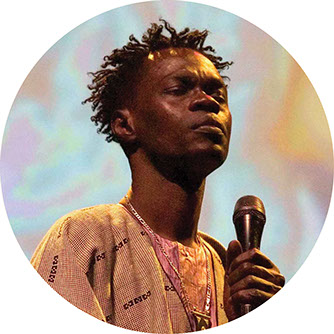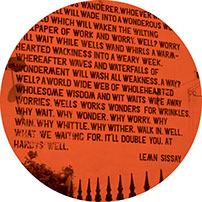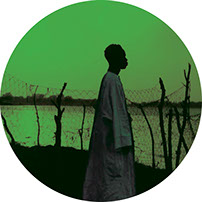N O T E S F R O M T H E S O U T H
 A World in a Voice
A World in a Voice
Peter Machen speaks to Senegalese superstar Baaba Maal about taking his voice to the people
“Baaba Maal! Baaba Maal!”
The occasion is the Awesome Africa music festival. One of Africa’s most celebrated musical talents is being called to the stage of the Playhouse Opera by the members of his ten-piece band. There is something about the way the various musicians are placed around the stage, that is reminiscent of a Shakespearean court. But when Baaba Maal arrives on stage, he isn’t like a prince. He is a prince, resplendent in a purple robe and resonating imperial presence. He instantly takes command of the stage. Everything yields before him and when he opens his mouth to sing, entire worlds emerge. A new Eden, a portal to paradise, a dark star immersed in light. Although he is approaching fifty, onstage he looks half that age. And, like so many musical superstars, he is both diminutive and androgynous, broadcasting a mesmerising pan-sexual energy. By the time he exits the stage nearly two hours later, the room is on fire.
When I meet him in his dressing room after the concert, in the labyrinthine depths of the Playhouse backstage, Maal is just finishing his post-gig dinner. His hands are smeared with the various greases of the mini smorgasbord prepared for him. He washes his hands and we start to talk.
And the superstar, still undoubtedly a prince, leans back into a matter-of-fact discussion, a Marlboro held intermittently in his hand. It’s rare that someone this famous and this accomplished, is so relaxed and humble, particularly after such an electric performance. No axes to grind, no ego to polish, no agendas to further, Maal talks honestly and easily about the road that brought him here.
He always knew, he says, that this was to be his fate. “I tried to hide from it, but I knew.” And while in print this might bear a glimmer of arrogance, for Maal it is a simple fact. He was born to do exactly what he does. And watching him on stage, you can see precisely what he means. He might be the very picture of performer-as-deity, but, as is often the case, that divinity exists because he is a conduit for something else, something that is more than human and larger than himself. So if he seems godlike on stage, it is because his very voice is suffused with divinity. And he can only say thank you when I tell him what he must have been told ten thousand times before.
Maal is a youth emissary for the United Nations. In this capacity, his chief role is to inform and educate the youth of Senegal and beyond about HIV and Aids. He had been road-tripping around the region with his band and other local musicians for some time doing precisely that, when the UN decided to piggyback on his activities in the fight against the virus. Senegal has the virus under control and only a relatively small proportion of the population are infected. But rather than seeing that as a reason for complacency, Maal recognises the importance of maintaining vigilance.
.jpg?crc=532026744)
I ask him if this position as an Aids educator ever brings him into conflict with his Muslim faith. He nods and raises his eyebrows in the affirmative. As well as educating the youth, he has also been helping to bring Senegal’s older population into the frontline of the sexual revolution made necessary by Aids. He says that because of the respect for traditional music that has defined his career, he has the ear of many older people in his community, and so they too listen to him when he tells them about the virus.
He tells me about a meeting he was having with a group of Muslim men during his first educational tour. “I know it’s not easy to talk about sex and all these things”, he says. “But the first time we were doing this educational tour, I organised a meeting in the afternoon. And on the hour of going to prayer, one of them said something really interesting. They were all saying it was time to go to the Mosque to pray. And one of them said ‘Listen! You have to sit down. Because what he’s talking about is about trying to find a way to save lives. And what we do in the mosque is teach people to make better lives. So I think this is the same thing, and I think we should stay and listen’. And I really liked this response from them.”
Maal and company still have a long way to go. There is a continent to educate, and the UN youth programme in which he is participating only comes to an end in 2017, by which time it is hoped that poverty and disease in Africa will have been substantially reduced, part-and-parcel of the broader Aids programme.
To this end, Maal talks about the importance of reaching all those who fall outside of the global media network – people who do not understand English and who have no access to television or even radio. These are the people to whom he feels most compelled to take his musical education.
And it is an education that moves beyond Aids, to discussions of the caste system, of ethnic grouping, and of how young people want to be free of all these things. When Maal sings, his audience know that as well as being submerged in beauty, they will find advice about their own lives. He says that he can’t run away from the political approach he has taken.
Besides, he says, with a determined grin, “I like it. And it’s very important”. When you get the chance to shift the world, even if only slightly, you may as well run with it. “Music can’t change the world”, he says, “But at least you can make people stop and listen.”
On a less vital note, many of Maal’s songs have been given substantial remix treatment. I ask him how he feels about this. “I love it”, he tells me. “I’m a very curious man, especially when it comes to music. I always want to know what’s the next step – if someone remixes my music, I want see what’s going to happen. It’s like a science experiment…I like it. And for me, music is not something that stays in one place and belongs to just one community – it’s for all the communities. So to see a DJ take one of my songs, I want to know exactly what he can do with it. Some people do great things, others do things that I can’t stand.” And he admits that he been on the dance floor and danced to remixes of his own songs. Which must be a pretty cool experience, even for the great Baaba Maal.
For Maal, these remixes don’t represent a different musical world but are instead a continuum of the same thing. It’s all music to move your body to, and it all started in Africa, as Leftfield so insistently tells us. So remixing Maal for the dance floor represents a complete cycle of history. He is currently working with hip-hop and rock band The Roots in Philadelphia on an album about which he is very enthusiastic, mixing his take on tradition with their cutting-edge freshness. This is just the latest in a series of collaborations with many of the world’s finest musical talents, ranging from Brian Eno to Taj Mahal. And by the time you read this, Maal will have worked with Jabu Khanyile in Johannesburg.
He says that he’d like to work with “everyone in South Africa” and laments the fact that he’s too late to work with Miriam Makeba. I suggest that Durban’s own Busi Mhlongo would be an amazing counterpoint to his voice and he agrees.
We all get up and exit the dressing room. I leave Maal to make his way to back to his hotel just across the street. Tomorrow he’s going to explore Durban, something he’s quite excited about. And I think of this sincere and laconic prince, with or without his entourage, with or without his purple robes, walking around this other African city for a single day, like a strangely distorted reflection of a dream.
© 2017 Peter Machen. All rights reserved About Contact Peter Machen Web design: The Communication Factory



